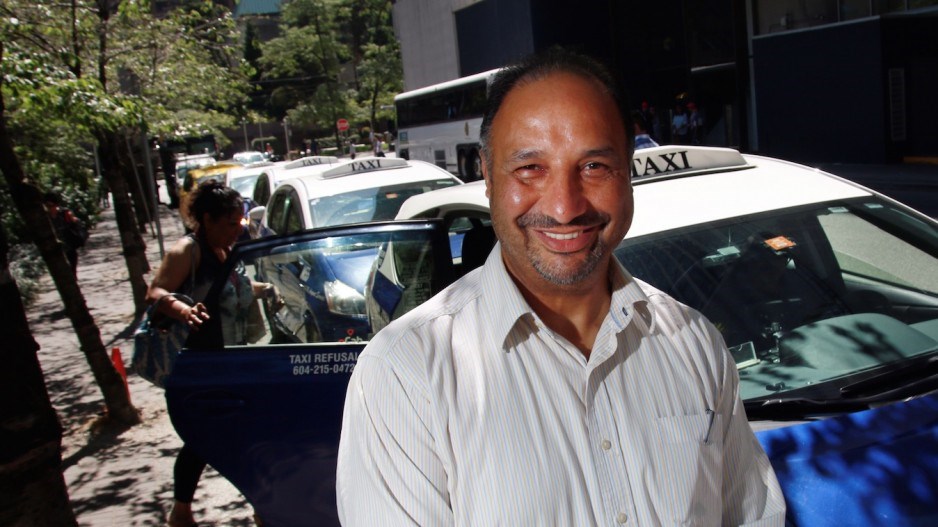Part of Business in Vancouver’s ride-hailing report series, Life in B.C.’s uber slow lane. BIV delves into the long and winding road to nowhere, taxi licence devaluation, Uber driver revenue realities, ride-sharing traffic jams and the apps already servicing Metro Vancouver’s Asian community.
About a decade ago, many Vancouver taxi drivers had a valuable asset. Those who owned the right to operate a taxi, under a B.C.-government-owned licence, could sell that entitlement for hundreds of thousands of dollars – sometimes more than $1 million.
But with the rise across North America of ride-hailing services such as Uber and Lyft, that value has evaporated, even though those ride-hailing services are still not legally allowed to operate in the province.
No one wants to buy the right to operate a taxi anymore, said MacLure’s Cabs vice-president Gurpal Nagra, whose company is licensed to operate 97 full-time taxis and 16 additional taxis on weekend nights and other peak periods.
“There is no value there now,” he told Business in Vancouver. “We used to sell our cars from my company for $600,000 or $700,000. Now, nobody is selling and nobody is buying. You can say that. There is no value.”
Nagra declined to estimate the value of the MacLure’s Cabs business, but he said the company owns a building that is worth about $15 million.
Entrepreneurs’ interest in buying shares of a taxi company or the authorization to either drive or lease a cab has dried up because they fear what the future holds in B.C.
The province is a rare region in North America that forbids residents from using their own vehicles to transport passengers who have booked a trip via an online app such as Uber.
Only commercial vehicles are allowed to conduct that service in B.C., and prospective Uber drivers must qualify under a wide range of qualifications and operate under the same rules as limousine companies – a stipulation that requires drivers to charge passengers a $75 minimum hourly rate. Former Minister of Transportation Mary Polak insisted on those rules and, in 2012, threatened fines for people who flouted them, thereby stalling Uber’s first foray into B.C.
{"preview_thumbnail":"/sites/default/files/styles/video_embed_wysiwyg_preview/public/video_thumbnails/-qxsJUDo5vI.jpg?itok=tcIS5b_i","video_url":"https://youtu.be/-qxsJUDo5vI","settings":{"responsive":1,"width":"854","height":"480","autoplay":1},"settings_summary":["Embedded Video (Responsive, autoplaying)."]}
The Insurance Corp. of British Columbia (ICBC), B.C.’s government-monopoly vehicle-insurance corporation, also helps the government keep close tabs on all vehicle insurance bought in the province and fines paid by vehicle owners.
B.C. Transportation Minister Claire Trevena acknowledged that the public wants ride-hailing options but did not acknowledge those obstacles for ride hailing during her July 19 press conference.
Instead, she repeated several times that prospective ride-hailing drivers are free to navigate the current regime to qualify to operate what would essentially be a taxi cab.
B.C.’s Passenger Transportation Board (PTB) accepts applications from people who want access to newly issued B.C. government-owned taxi licences, but successful applicants must justify why their application should be granted and guarantee that the new licence will not adversely affect existing drivers.
That same board approves limousine licences.
The good news for people who want to have better taxi service in the short term is that Trevena has committed to increasing the number of taxis on the province’s roads by 15%, or 500, likely by fall.
But that does not mean more taxi licences, PTB chairwoman Catharine Read stressed to BIV.
She clarified that the 500 new taxis B.C.-wide, including 300 in Metro Vancouver, would all go to current licensees.
Read said on July 24 that she intended to soon meet representatives of the BC Taxi Association, the Vancouver Taxi Association and other taxi associations to determine which members and which areas need more taxis.
Which of those associations’ member companies will be granted additional taxis is yet to be determined, Read said.
“They have to apply for them, right?” she said. “They need to want them, and they need to apply for them.”
Complications also arise in evenly distributing the additional taxis among all licensees who want more cars.
“If you only have one taxi vehicle on your licence, a 15% increase in your number of taxis is not another taxi,” she said.
Trevena has also promised to alter six pieces of provincial legislation to allow things such as charging below-meter fares in off-peak periods.
She will also have ICBC create a new insurance product for ride-hailing drivers.
Nagra told BIV that he has no problems with ride-hailing services as long as the drivers and vehicles are subject to the same testing and requirements as his drivers and vehicles are.
For example, no Vancouver taxis can be more than seven years old and taxi operators must pay approximately $24,000 per year in insurance.
“ICBC is losing money,” he said. “So why should they subsidize a car that is doing the same thing as a taxi?” •




